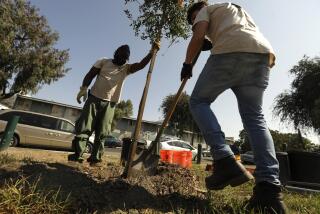Aspen, Colo., bears like them apples; officials want trees stripped
- Share via
If Aspen, Colo., officials were ever to ask the age-old question “How do you like them apples?” the local bear population might very well respond, “Very well, thank you.”
As the Rocky Mountain resort city grows, so does its problem with black bears, which are attracted by the crab apple trees that grow within the city.
This year is worse than ever. With drought and fire conditions reducing the bears’ natural food sources, city officials are exploring how to handle the hundreds of thousands of alluring crab apples in trees lining Aspen’s streets.
The Colorado Division of Parks and Wildlife has told city officials and homeowners alike to harvest fruit from trees, to help keep bears out of them and away from humans.
“We’ve talked with Aspen for at least the last five years. Bear incidents there have always been an issue – the city is located in the best black bear habitat in North America. But this year it’s worse,” state wildlife spokesman Randy Hampton told the Los Angeles Times. “As Aspen’s population grows, so does its bear issue.”
Officials have pestered Aspen residents to remove items that attract the bears, such as crab apples, unprotected trash and bird feeders.
Area wildlife manager Perry Will said he’s willing to further press the issue with city officials, but wants them to act on their own.
“Would we prefer to have attractants removed? Yes, we would,” Will told the Aspen Daily News. “But they’d probably prefer we keep the bears out of town, too.”
Aspen city parks and open space director Stephen Ellsperman said officials are aware that the crab apple trees attract bears, but told the Daily News that keeping them fruit-free would require an undue amount of manpower.
“It’s not as easy as it might sound to pick a bunch of crab apple trees,” he said.
He said the public is not likely to support cutting down the crab apple trees that line downtown’s pedestrian malls and sidewalks, parks and public buildings, many of the trees 30 to 40 years old.
“We’ve got these iconic groupings of crab apple trees that were part of the development of public spaces,” Ellsperman said. “I think everyone agrees they’re beautiful and they’re synonymous with the downtown core. We’re not able to cut those down.”
But Hampton says the city must do something.
“When we say the bears have experienced a natural food failure, we don’t mean a complete loss of food,” he told The Times. “It’s just that the natural food becomes more scarce, and the bears have to travel to find it.
“And in a state with 5.2 million residents, that means they’re going to come across people – in campgrounds and in places like Aspen.”
ALSO:
Amy Bishop in prison for life -- but wants another trial
Poodle survives 11-mile ride in car grille; now to find owner
Oregon farmer eaten by hogs: Did he fall -- or was he attacked?
More to Read
Sign up for Essential California
The most important California stories and recommendations in your inbox every morning.
You may occasionally receive promotional content from the Los Angeles Times.











